
JOURNAL OF VESTIBULAR RESEARCH-EQUILIBRIUM & ORIENTATION
Scope & Guideline
Connecting Research and Practice in Vestibular Studies
Introduction
Aims and Scopes
- Vestibular Disorders and Diagnostics:
The journal emphasizes research on various vestibular disorders such as benign paroxysmal positional vertigo, Meniere's disease, and vestibular migraines, focusing on diagnostic criteria, clinical characteristics, and the development of reliable diagnostic tools. - Vestibular Rehabilitation and Therapies:
A significant area of focus includes the efficacy of different rehabilitation strategies for vestibular disorders, assessing methods like vestibular rehabilitation therapy, telehealth interventions, and the use of innovative technologies such as virtual reality. - Clinical and Epidemiological Studies:
The journal publishes studies examining the prevalence and impact of vestibular disorders across populations, including health disparities in vestibular rehabilitation and the effects of conditions like COVID-19 on vestibular function. - Experimental and Biomechanical Research:
Research exploring the underlying mechanisms of vestibular function, including the biomechanics of balance, sensory integration, and the physiological responses to vestibular stimuli is a core aspect of the journal. - Psychometric and Qualitative Assessments:
There is an emphasis on psychometric evaluation of vestibular function tests and qualitative studies exploring patients' experiences with vestibular disorders, enhancing understanding of the subjective impact of these conditions.
Trending and Emerging
- Telehealth and Remote Rehabilitation:
The increasing focus on telehealth for vestibular rehabilitation signifies a shift towards more accessible healthcare solutions, particularly in response to the COVID-19 pandemic, showcasing the need for innovative approaches to patient care. - Impact of COVID-19 on Vestibular Health:
Research on dizziness and vestibular symptoms related to post-COVID conditions has gained prominence, addressing the long-term effects of the pandemic on vestibular health and rehabilitation. - Cross-Cultural and Psychometric Studies:
Emerging studies focusing on cross-cultural adaptations of vestibular assessment tools and psychometric evaluations underscore the importance of culturally sensitive approaches and accurate measurement in diverse populations. - Integration of Technology in Vestibular Assessment:
The utilization of advanced technologies, including virtual reality and mobile applications for vestibular testing and rehabilitation, is a growing trend, indicating a shift towards more interactive and patient-centered approaches. - Cognitive and Vestibular Interactions:
The exploration of the relationship between cognitive function and vestibular disorders is increasingly prevalent, reflecting a broader interest in understanding how vestibular dysfunction impacts cognitive processes and vice versa.
Declining or Waning
- Focus on Traditional Diagnostic Methods:
There appears to be a waning emphasis on traditional vestibular diagnostic techniques, such as caloric tests, as newer, more efficient methods gain traction in clinical settings. - Limited Research on Rare Vestibular Disorders:
Research on less common vestibular disorders may be decreasing, as the journal appears to prioritize more prevalent conditions that have significant clinical implications. - Decreased Attention to Physiological Mechanisms:
There has been a reduction in studies specifically aimed at elucidating the physiological mechanisms behind vestibular disorders, possibly overshadowed by clinical and rehabilitation-focused research.
Similar Journals

Audiology Research
Transforming Insights into Audiology PracticesAudiology Research, published by MDPI, is a reputable open-access journal since 2011, dedicated to advancing the field of audiology through the dissemination of high-quality research. With ISSN 2039-4330 and E-ISSN 2039-4349, the journal serves a global audience from its base in Basel, Switzerland, and operates under rigorous peer-review standards to ensure the integrity of published content. With a 2023 Impact Factor placing it in the Q2 category for both Otorhinolaryngology and Podiatry, Audiology Research has established itself as a significant platform for researchers, professionals, and students seeking to explore various aspects of hearing science, auditory disorders, and rehabilitative practices. Its commitment to open access fosters wider dissemination and accessibility of research findings, thereby promoting interdisciplinary collaboration and enhancing patient outcomes within the audiology community. The journal's alignment with major indexing databases, alongside its Scopus ranks—#4 in Health Professions: Podiatry and #65 in Medicine: Otorhinolaryngology—reflects its growing influence and dedication to impactful contributions in the health sciences.

DYSPHAGIA
Empowering Research in Gastroenterology and OtorhinolaryngologyDYSPHAGIA, published by Springer, is a premier journal dedicated to advancing the study of swallowing disorders, a critical area within the fields of Gastroenterology, Otorhinolaryngology, and Speech and Hearing. With an ISSN of 0179-051X and E-ISSN 1432-0460, this journal serves as a vital resource for researchers, clinicians, and students alike, providing cutting-edge research and reviews that inform clinical practice and enhance patient care. As a testament to its influence, DYSPHAGIA holds a Q2 ranking in Gastroenterology and Q1 rankings in both Otorhinolaryngology and Speech and Hearing for 2023. Its Scopus rankings further position it among the leading journals in its field, highlighting its importance and impact within the academic community. The journal publishes contributions that encompass a spectrum of topics related to swallowing, making it an essential platform for disseminating knowledge and fostering innovative solutions in the management of dysphagia. Operating from New York, NY, DYSPHAGIA invites contributions that align with its mission to advance the understanding and treatment of swallowing disorders through rigorous scientific inquiry and discourse.

Ideggyogyaszati Szemle-Clinical Neuroscience
Illuminating the Path of Neurological DiscoveriesIdeggyogyaszati Szemle-Clinical Neuroscience, an esteemed publication under the auspices of LITERATURA MEDICA, serves as a pivotal platform in the field of neurology and clinical neuroscience. Established in Hungary, this journal has been committed to advancing the understanding of neurological disorders and treatments since its inception. With its ISSN 0019-1442 and E-ISSN 2498-6208, it provides a unique local perspective alongside valuable contributions to the global discourse in neuroscience. Despite earning a Q4 quartile ranking in both Neurology and Clinical Neurology, the journal remains dedicated to publishing high-quality research that contributes to the scientific community's collective knowledge. Its coverage spans significant converged years from 1954 to 1985 and now continues through 2024, reflecting a rich historical foundation. Recognizing the importance of open access, the journal strives to enhance accessibility, albeit currently lacking a formal open-access model. Researchers, professionals, and students in the field will find in Ideggyogyaszati Szemle a resource vital for keeping abreast of emerging trends and findings in neurological science.
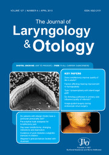
JOURNAL OF LARYNGOLOGY AND OTOLOGY
Exploring Innovations in Ear, Nose, and Throat CareJournal of Laryngology and Otology, published by Cambridge University Press, is a prestigious peer-reviewed journal dedicated to the fields of laryngology and otology. With its rich history dating back to 1891, the journal provides a platform for cutting-edge research, review articles, and clinical studies that advance the understanding and treatment of disorders related to the ear, nose, and throat. As evidenced by its ranking in the Q2 category for both Medicine (miscellaneous) and Otorhinolaryngology, the journal is recognized for its significant contributions to medical literature, holding its place at Rank #45 among 123 in the Scopus database for this specialty. Although it does not offer open access, it is widely accessible to professionals and academics in the field, and remains an invaluable resource for those seeking to stay updated with the latest advancements in laryngology and otology. The ISSN for the journal is 0022-2151 and the E-ISSN is 1748-5460, ensuring its broad reach and appeal within the global scientific community.
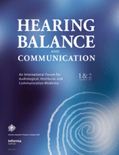
Hearing Balance and Communication
Fostering understanding in auditory and vestibular health for enhanced patient care.Hearing Balance and Communication is a prominent peer-reviewed journal dedicated to advancing the fields of Otorhinolaryngology, Speech, and Hearing. Published by Wolters Kluwer Medknow Publications, this journal serves as a valuable resource for researchers, clinicians, and students invested in exploring the multifaceted aspects of auditory and vestibular health. With an ISSN of 2169-5717 and an E-ISSN of 2169-5725, it has established itself as a significant platform since its inception in 2013, boasting a commendable Q3 ranking in both Otorhinolaryngology and Speech and Hearing categories as of 2023. The journal emphasizes the dissemination of original research, reviews, and case studies that foster a deeper understanding of hearing and balance, as well as effective communication practices. Located in the United Kingdom, Hearing Balance and Communication is a key player in bridging research and clinical practice, ensuring that vital findings reach the professionals who can implement them in real-world settings, thus increasingly impacting patient care and public health.
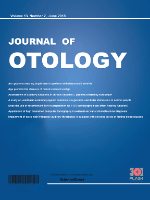
Journal of Otology
Advancing Knowledge in OtorhinolaryngologyWelcome to the Journal of Otology, a leading open-access publication dedicated to advancing the field of Otorhinolaryngology. Published by Elsevier since 2006, this journal serves as a vital resource for researchers, clinicians, and students alike, offering a platform for high-quality, peer-reviewed articles that contribute to the understanding and treatment of ear-related conditions. With an impactful presence in the academic community, the Journal of Otology has achieved a commendable Q2 ranking in its category, reflecting its commitment to excellence and innovation in medical research. Based in China, this journal not only promotes accessibility through its open-access model but also fosters global collaboration by making cutting-edge research available to all. Between its convergence years from 2006 to 2024, the journal continuously strives to bridge the gap between theory and practice in Otorhinolaryngology, placing it prominently on the radar of professionals seeking to stay informed on the latest developments in the field.

Auditory and Vestibular Research
Pioneering Discoveries in Speech and Hearing SciencesAuditory and Vestibular Research is an esteemed open-access journal published by Tehran University of Medical Sciences, dedicated to advancing the field of otorhinolaryngology and speech and hearing sciences. Established to foster scholarly communication, this journal has gained traction since its inception and has been openly accessible since 2015, encouraging a wider dissemination of research findings. With an E-ISSN of 2423-480X, it features a diverse range of studies and reviews that reflect the latest advancements and methodologies in auditory and vestibular functioning. As of 2023, the journal is ranked Q3 in both Otorhinolaryngology and Speech and Hearing categories, indicating a growing significance within the academic landscape, especially among researchers and healthcare professionals focusing on auditory health. By publishing quality research and facilitating dialogue within the community, Auditory and Vestibular Research plays a crucial role in informing practice and enhancing knowledge in these vital areas of medicine.
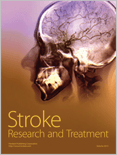
Stroke Research and Treatment
Pioneering open access knowledge in stroke management.Stroke Research and Treatment is a premier Open Access journal published by HINDAWI LTD, dedicated to advancing the understanding and management of stroke and related neurological disorders. Since its inception in 2010, this journal has established itself as a valuable resource for researchers and clinicians in the field of neurology, providing a platform for high-quality, peer-reviewed articles that aim to improve patient outcomes and stimulate clinical practice innovations. With a 2023 Scopus ranking placing it in the Q3 category and a percentile ranking of 44th in clinical neurology, the journal is positioned to influence the ongoing discourse in stroke research. Stroke Research and Treatment embraces a global audience, with its editorial operations based in London, England. The journal's commitment to open access ensures that its content is freely available to all, promoting extensive dissemination and engagement in this critical field of study. Researchers, professionals, and students are encouraged to contribute their findings to this dynamic journal, fostering collaboration and knowledge sharing in the ongoing fight against stroke.

International Archives of Otorhinolaryngology
Connecting research and practice in ENT specialties.The International Archives of Otorhinolaryngology is a leading peer-reviewed journal dedicated to the field of otorhinolaryngology, published by GEORG THIEME VERLAG KG. With an E-ISSN of 1809-4864, this Open Access journal has been committed to disseminating high-quality research since its inception in 2012, enabling researchers and practitioners worldwide to access the latest advancements and insights without barriers. Recognized in 2023 as a Q2 journal in the Otorhinolaryngology category, it ranks 57th out of 123 in Scopus, placing it in the 54th percentile, indicating its influence and relevance in the field. Covering a wide array of topics from clinical practices to innovative research, the journal serves as an essential resource for professionals, researchers, and students aiming to enhance their understanding and practice within this specialty. Its diverse content and dedication to promoting scientific inquiry make the International Archives of Otorhinolaryngology a cornerstone in the advancement of knowledge in ear, nose, and throat medicine.
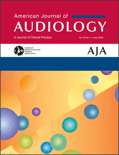
American Journal of Audiology
Unveiling the Latest in Hearing Health ResearchWelcome to the American Journal of Audiology, a leading publication in the field of audiology and speech-language pathology, published by the American Speech-Language-Hearing Association. With an ISSN of 1059-0889 and E-ISSN of 1558-9137, this journal provides a vital platform for researchers and practitioners to share innovative studies, clinical practices, and evidence-based findings spanning over two decades, from 1996 to 2024. As a recognized authority in its category, the journal holds a Q2 rank in Speech and Hearing as per the 2023 category quartiles, and ranks #25 out of 66 in Scopus for Health Professions, landing it in the 62nd percentile for this field. Although not open access, the journal remains dedicated to advancing the science of audiology, aiming to enhance the professional community's knowledge and contribute to improved patient care. Addressed from 2200 Research Blvd, #271, Rockville, MD 20850-3289, the American Journal of Audiology is essential for those looking to stay at the forefront of research and trends in audiology.